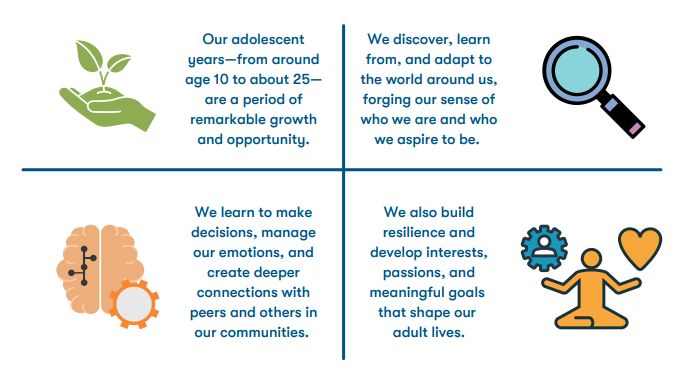The Core Science of Adolescent Development

Adolescence is a time of remarkable opportunity. The years between age 10 to about 25 mark a period of rapid growth, development, and learning as we discover and adapt to the world around us. We forge our sense of who we are and who we aspire to be. We learn to make decisions, manage our emotions, and create deeper connections with peers, romantic partners, and others in our communities. We also build resilience, and develop interests, passions, and meaningful goals that shape our adult lives.
Opportunities to try new things, such as tackling challenging school projects, forming relationships with new people, engaging in community service, and learning from mistakes along the way can support positive development. All of us need opportunities to experiment and explore in ways that help support healthy adaptation.
During adolescence, we are rapidly learning and adapting in ways that naturally take advantage of supportive relationships, environments, and experiences that promote positive growth and development. This makes adolescence a key window for learning and discovery as well as an opportunity to mitigate the effects of earlier adversity. Experiences that provide autonomy and choice as we explore are particularly important during these years.
Unfortunately, the social systems that serve us during this developmentally sensitive period are often not structured to provide optimal support for learning and positive adaptation. In some cases, barriers to successful development—such as poverty, discrimination, and earlier trauma—can reinforce inequities and amplify risks for negative outcomes. Adults working to support youth must transform dysfunctional and discriminatory systems to ensure that ALL adolescents have the support to explore, discover, and become a force for good in our communities and society.
To take advantage of the opportunities of adolescence, we need policies and programs that meet the unique developmental needs of this period. In addition to food, housing, and resources for a quality academic education, these needs include:
- Safe and satisfying ways to explore the world and take healthy risks to test out new ideas and experiences
- Real-world scenarios in which to build decision-making and emotional regulation skills
- Avenues to develop a sense of meaning and purpose by contributing to peers, families, and communities
- Positive ways to earn respect and social status among peers and adults
- Experiences that help define personal values, goals, and a positive sense of identity
- Warmth and support from parents and other caring adults
The Core Science of Adolescent Development was developed in partnership with FrameWorks Institute.
The Core Science of Adolescent Development
Key Developmental Needs Infographic
